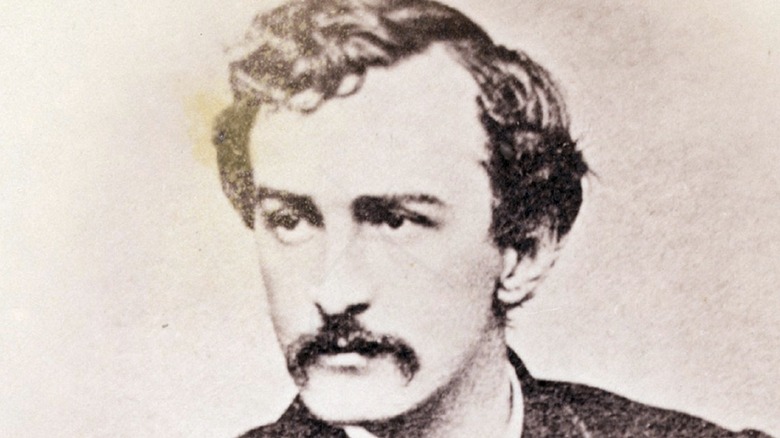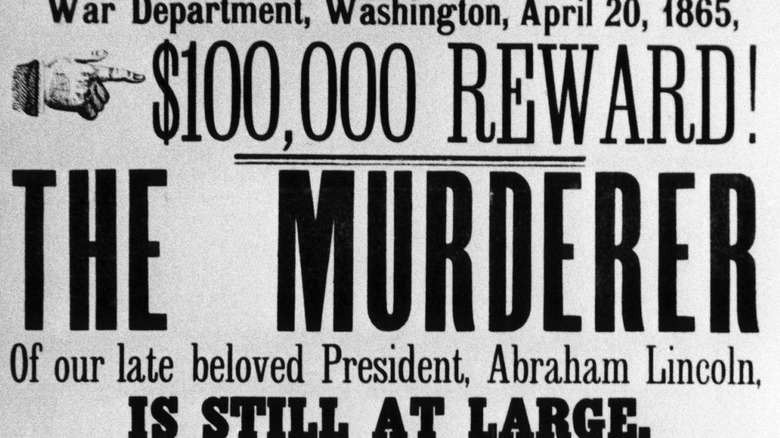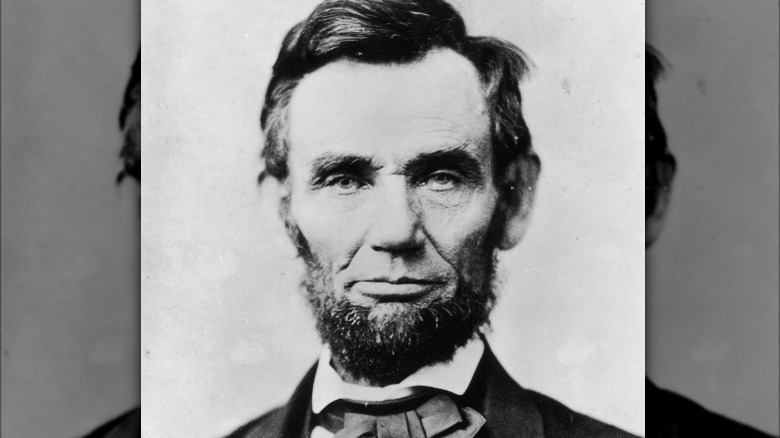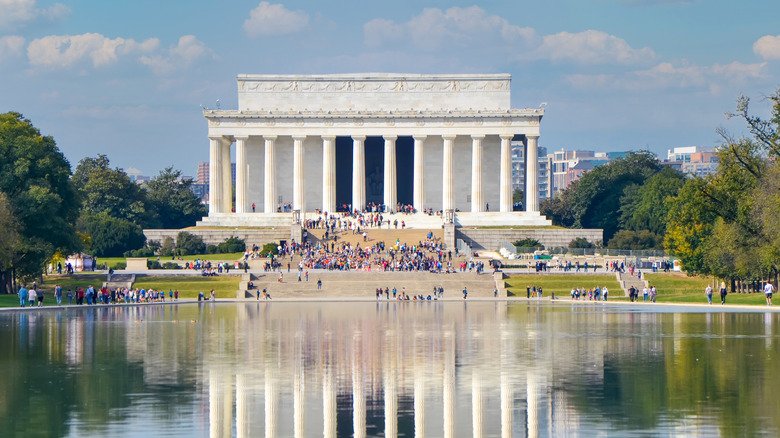What Really Happened After Abraham Lincoln Died?
Abraham Lincoln began his second term as President of the United States on March 4, 1865, per the Abraham Lincoln Historical Society. On April 15, just weeks later, he died. The Library of Congress relates the tragic story: The night before he had been in attendance at a play, "Our American Cousin," performed at Ford's Theatre. While the president was enjoying the proceedings, actor John Wilkes Booth (above) crept into the president's box and fired a shot at Lincoln from behind. After a tussle with Major Henry R. Rathbone, Booth leapt to the stage and escaped. The mortally wounded Lincoln was transported to Peterson House, directly across from the theater. He died at 7:22 a.m. the next day. Many dramatic events unfolded after Lincoln's assassination.
The Abraham Lincoln Historical Society states that 10,000 officers and detectives joined the hunt for Booth, a star actor whose support for the Confederacy led him to hatch a plot to murder the president, Secretary of State William Seward, and Vice President Andrew Johnson. His co-conspirators, Lewis Powell and George Atzerodt, were supposed to attack simultaneously with him. Powell attacked Seward in the Old Clubhouse, six blocks away, according to Civil War Times (via HistoryNet). Seward survived a knife attack only because he happened to be wearing a thick dental brace after a carriage crash. Powell would hang on July 7, 1865, after being brought to trial along with other members of the conspiracy. Atzerodt backed out.
John Wilkes Booth and his conspirators meet their ends
Meanwhile, the War Department offered a $50,000 reward for the capture of Booth (via History), and $25,000 each for accomplices David C. Harold and John H. Surratt. Booth and Herold's luck ran out after 12 days as fugitives. Members of the 16th New York Cavalry trapped the pair in a Virginia tobacco barn, threatening to burn it down.
Herold surrendered, but Lincoln's killer seemed intent on fighting. Detective Everton Conger reported (per History) that a colleague had set fire to a corner of the barn, and a doomed Booth started to approach the door before being shot by Sergeant Boston Corbett. The assembled men dragged Booth out and laid him on the ground. Unrepentant, he supposedly declared, "Tell mother I die for my country." He suffered for hours before dying just after 7 a.m. After Booth's death, per History, conspiracy theories persisted that another had died in the assassin's place, but there has never been serious evidence.
As The White House Historical Association reports, Lincoln's funeral took place on April 19, 1865. It was a public affair with 600 attendees, centered around the East Room of the White House. Lincoln's devastated widow didn't attend.
An international outpouring of grief
As the Department of State's Office of the Historian reports, Lincoln's assassination was an unprecedented event in world history. He was the first U.S. president to be assassinated, and, inevitably, the news sent shockwaves around the globe. In response, the Department of State of 1866 released a document unlike anything ever seen before. It was titled "The Assassination of Abraham Lincoln, Late President of the United States of America, and the Attempted Assassination of William H. Seward, Secretary of State, and Frederick W. Seward, Assistant Secretary, on the Evening of the 14th of April, 1865."
This release, the Office of the Historian goes on, comprised "expressions of condolence and sympathy inspired by these events." Some 1146 documents were included, all in all, featuring press articles, official letters and more from nations from Austria to Venezuela. "His Majesty, the King, as well as the whole people of Denmark, sincerely and earnestly sympathize with the people of the United States in their affliction and their mourning over the loss of a ruler whose great qualities and many virtues were fully appreciated by my countrymen," one translated missive from the Scandinavian nation read (per Office of the Historian).
One of the nation's most important presidents
For millions today, Lincoln is best remembered for his dramatic and shocking assassination. However, it would be a great injustice to one of the nation's most acclaimed presidents to remember him only for this. Lincoln had a huge role to play in shaping the past, present and future of the United States. A staunch defender of the Declaration of Independence and everything it stood for, as the National Park Service reports, he strove to further the cause of democracy while acknowledging its limitations. As he put it himself, "... in relation to the principle that all men are created equal, let it be nearly reached as we can." These words emphasize the fact that inequality was an awful issue in Lincoln's time, and, sadly, there's still much work to be done in this area today.
Lincoln certainly had (and has) his detractors. He certainly had failings. However, perhaps the greatest example of his legacy came from another American icon, Martin Luther King Jr. In August 1963, The National Park Service goes on, King said, "Five score years ago, a great American, in whose symbolic shadow we stand today, signed the Emancipation Proclamation ... his momentous decree came as a great beacon light." This was the legendary speech "I Have A Dream," and perhaps the most important thing that happened after Lincoln's death was that the president's work became an eternal part of that dream.



